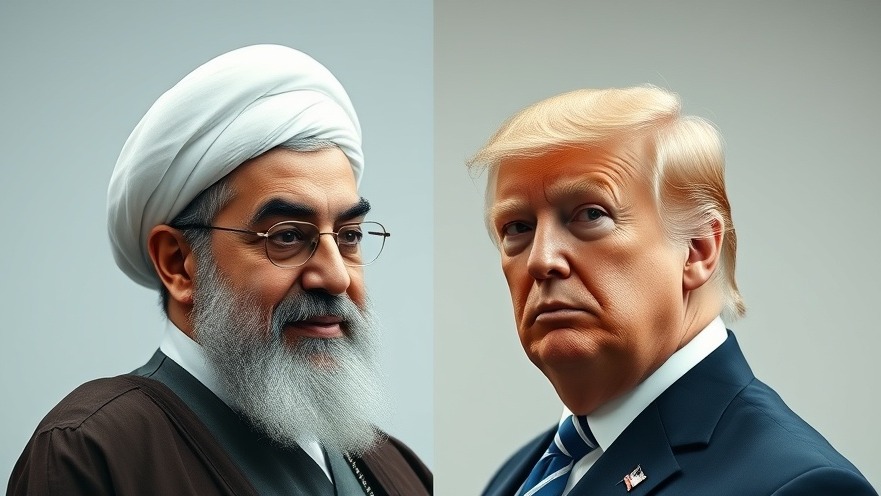
Understanding the Urgency for U.S.-Iran Diplomacy
In recent discussions regarding U.S.-Iran relations, a distinct urgency has emerged with President Trump's declaration of a two-week window for potential diplomatic negotiations. It has been reported that Special Envoy Steve Whit will engage with Iranian officials to explore possible pathways to address nuclear concerns. The nature of these engagements raises crucial questions about their implications for U.S. foreign policy and regional stability.
In 'State Dept's Tammy Bruce Asked Why Trump Has Created Two-Week Window For Diplomacy With Iran,' key insights emerge around U.S.-Iran relations that prompt deeper analysis on diplomatic engagements.
The Stakes of a Nuclear Iran
Iran's pursuit of nuclear capabilities has long been a flashpoint in international relations. With the White House estimating that it could take mere weeks before Iran might reach the threshold for developing a nuclear weapon, the urgency of diplomatic efforts cannot be understated. Trump's statement reflects a tactical approach, suggesting that he recognizes the existential risks involved.
This urgency aligns with historical U.S. commitments to preventing the proliferation of nuclear weapons. The impact of a nuclear-armed Iran could have consequential effects not only on regional security but also on global peace. As negotiators tread into delicate territory, it is essential to remember the stakes involved and potential global ramifications.
Historical Context of U.S.-Iran Relations
Reflecting on the history of U.S.-Iran relations provides valuable context to understand today's dilemmas. Diplomatic ties have remained strained since the Iranian Revolution in 1979, leading to decades of conflict, sanctions, and military engagement. Previous attempts at negotiation, including the landmark JCPOA (Joint Comprehensive Plan of Action), illustrate both the potential for dialogue and the complexities involved.
Trump’s presidency has seen a break from conventional diplomatic practices, opting for a more confrontational stance during his first term. His approach, however, has evolved to encompass a more measured readiness to negotiate, indicating a recognition that collaboration may be necessary to stave off conflict.
The Role of Domestic and International Influences
Domestic pressures significantly influence foreign policy decisions. Trump's desire for reelection, coupled with changing public opinions on immigration and national security, shapes how the administration approaches foreign threats such as Iran. Amidst concerns over economic wellbeing, rising tensions in the Middle East could sway American voters’ perspectives on leadership effectiveness.
Internationally, the shifting dynamics surrounding U.S.-China relations and Russia's geopolitical maneuvers further complicate the landscape in which the U.S. must navigate its diplomatic overtures. The implications of U.S.-Iran negotiations are likely to resonate beyond State Department offices, impacting relations with key allies and rivals alike.
Predicting Outcomes: What Lies Ahead?
As President Trump maneuvers through this proposed two-week diplomacy window, the outcomes could shape not just U.S.-Iran relations but also international diplomatic relations more broadly. The potential for a breakthrough could herald a new era of negotiation with other nations parallel to Iran, allowing the U.S. to reclaim a leading role in global diplomacy.
Conversely, failure in these negotiations could lead to escalated tensions, military engagements, and further deterioration of U.S. standing on the world stage. The next weeks will be consequential in determining whether stabilizing measures can be established in a historically volatile region.
Conclusion: Engaging with the Global Dialogue
This unfolding narrative of U.S.-Iran diplomacy underscores how intertwining domestic and international dynamics complicate governance. For those interested in the rapidly evolving landscape of international relations, the details surrounding the U.S.'s engagement with Iran will serve as a pivotal case study on the effectiveness of diplomacy under pressure.
If you're interested in keeping up with the latest insights on U.S. foreign relations and national security, follow trusted sources that offer comprehensive analyses on these topics. Understanding the undercurrents of diplomacy, particularly in contexts as complex as those involving Iran, is essential for being informed in today's rapidly changing world.
 Add Element
Add Element  Add Row
Add Row 



 Add Row
Add Row  Add
Add 


Write A Comment